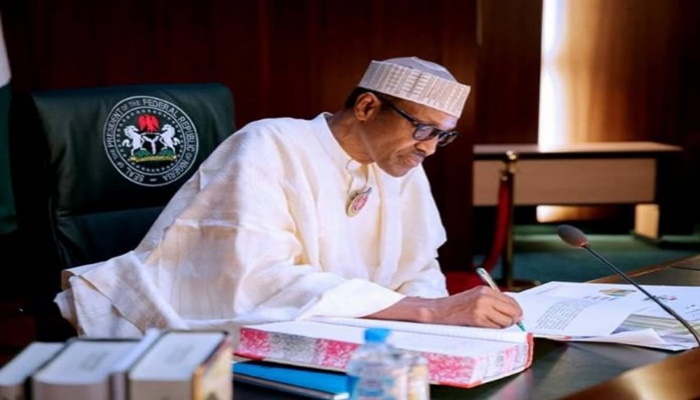Nigeria will no longer tolerate undocumented cross-border movement of persons, animals, says Buhari
*In speech delivered by VP at ECOWAS meeting in Abuja, FG seeks enforcement of transhumance protocols to avoid escalation of national security challenges
Nigeria will follow the regional cooperation model it used in dealing with the threat of Boko Haram to tackle the security threat posed by the escalating violence between farmers and herders, according to Vice President Yemi Osinbajo, SAN.
Prof. Osinbajo stated this today at the opening session of the extra-ordinary ministerial meeting of Ministers of Agriculture and Security in ECOWAS Member States, held at the ECOWAS Parliament, International Conference Centre, Abuja.
According to him, “we are seeing evidence that the competition for land and water is being complicated by the actions of criminal networks who are taking advantage of the proliferation of illegal weapons as well as our porous borders all across the West African sub-region.
“Clearly, the importance of regional cooperation, in border management, in law enforcement, and in identity management, cannot be overemphasized.”
He said: Boko Haram is a spent and factionalised force, unable to challenge our territorial integrity, and is becoming less and less a threat across the sub-region. This is on account of the sub-regional cooperation that has been put in place.
“A similar approach is required, this time across the whole West Africa, regarding the security situation associated with transhumance migration.”
SPEECH DELIVERED BY HIS EXCELLENCY, PROF. YEMI OSINBAJO, SAN, VICE PRESIDENT, FEDERAL REPUBLIC OF NIGERIA AT THE OPENING SESSION OF THE EXTRA-ORDINARY MINISTERIAL MEETING OF MINISTERS OF AGRICULTURE AND SECURITY IN ECOWAS MEMBER STATES, HELD AT THE ECOWAS PARLIAMENT, INTERNATIONAL CONFERENCE CENTRE, ABUJA ON THURSDAY APRIL 26, 2018.
PROTOCOL
It is my special privilege and pleasure to welcome you to this extra-ordinary ministerial meeting of Ministers of Agriculture and Security in ECOWAS Member States.
I would also like to specially recognise participants from other Regional Economic Communities (RECs), and international partners at this meeting, for taking the time to join us to share insights and expertise on the issue of addressing the escalating tensions between farmers and herders across West Africa.
Tensions between pastoralists and farmers are by no means new or even a recent phenomenon; they have existed for as long as humans have practiced crop and animal farming side by side.
But in recent years, we have seen an alarming escalation in tensions between crop farmers and pastoralists across Africa and even though these tensions have their origins in a competition for resources, sooner than later they become overlaid or intertwined with ethnic, religious and partisan grievances.
The immediate driver of the rising violence is of course the increasing competition for land and water which are themselves impacted by the effects of climate change and related environmental factors.
But we are also seeing evidence that this competition is being complicated by the actions of criminal networks who are taking advantage of the proliferation of illegal weapons as well as our porous borders all across the West African sub-region.
Clearly, the importance of regional cooperation, in border management, in law enforcement, and in identity management, cannot be overemphasized.
In tackling the security threat posed by the escalating violence between farmers and herders, we intend to follow the regional cooperation model which we pursued in dealing with the threat of Boko Haram.
One of the first things that President Buhari did on assumption of office in 2015 was to visit our immediate neighbours – Cameroon, Niger, Chad, Benin – to enlist their support for the revitalisation of the Multinational Joint Task Force.
It was clear then that Boko Haram was taking advantage of the lack of regional cooperation that existed at the time, and we were all suffering for it. And so we decided then, and the President went ahead to demonstrate the required leadership and political will, and today the results are clear for all to see: it is clear that Boko Haram is a spent and factionalised force, unable to challenge our territorial integrity, and is becoming less and less a threat across the sub-region. This is on account of the sub-regional cooperation that was put in place at the time and we need to do a similar thing here.
So, a similar approach is required, this time across the whole West Africa, regarding the security situation associated with transhumance migration, keeping in mind the amplifying effect on these conflicts of the infiltration of mercenary bandits, terrorists, arms and drug traffickers, and transnational crime networks.
Two ECOWAS protocols are critical to the conversation that we are going to have here today; the 1979 Protocol of free movement of Persons, Goods, Capital and Services; and the protocol relating to transhumance in 1998.
Regrettably, what we have been confronted with over the years is the failure to fully follow and enforce the terms of the protocols. In some cases, the failure to activate sections of the protocol so that where, for example, transhumance certificates are to be used and endorsed by medical or immigration officials, this has not been done. This has to change. We can no longer continue to tolerate the undocumented movement of persons and animals that simply contribute to the escalation of our security challenges.
We must be able to track movement, we must ensure that our protocols are complied with and ensure that the relevant sections are activated.
We must not allow the noble vision of the founding fathers, a vision of regional integration, to be derailed by a failure to comply with the safeguards and conditions that they, in their wisdom and foresight, embedded in these protocols.
This is why Nigeria has taken the lead in organising this conference, bringing together senior government officials with oversight for agriculture and internal security, from across ECOWAS and beyond, to fashion out collaborative solutions to a lingering problem that threatens not just national security in our various countries but also regional security as well.
The economic implications are also quite worrisome, considering that as much as 70% of the population of ECOWAS region makes a living primarily off agriculture. For many of our countries already struggling with food security, the violence threatens to tip us over the edge into the realms of catastrophe.
I am hopeful that this conference will keep in mind the theme of ‘Working Together for Regional Integration, Peace and Security’, and also provide an opportunity for us to reflect on current developments and possible responses and solutions in a holistic manner.
For example, it is clear that the grazing of cattle across long distances needs to be reviewed in favour of ranching. Everywhere in the world transhumance which is simply, the seasonal grazing of cattle, was where it all started but that is not necessarily how it must continue. It became clear that the most productive way of breeding cattle is not to walk them long distances but to provide well equipped ranches.
We must explore new and creative solutions to an old problem. These solutions must, of course, take into consideration everything from law enforcement to climate change mitigation and reforms in current methods and practices of crop and animal production.
We must move with the times and modernize our thinking and our approach to these issues facing us. We must be able to distinguish between legitimate agricultural work and the criminality that is seeking to use it as cover to destabilise the region.
We must strive to respect the opinions and views of all stakeholders and not allow room for distrust and cynicism in our dealings with one another as ECOWAS member states.
Internally, in Nigeria, we are also working with our state governments, who have the primary responsibility for the management of land resources. We have just concluded work on a plan, jointly put together by the Federal and State Governments, on the sustainable resolution of herder-farmer conflicts, and we are now at the point of implementing that plan.
I am optimistic that the sharing and exchange of ideas at the conference will strengthen us collectively and better prepare us to triumph in the face of all threats.
In closing, let me commend Nigeria’s Minister of Interior, Lt.-Gen. Abdulrahman Bello Dambazau (Rtd.), and the President of the ECOWAS Commission, H.E. Jean-Claude Kashim Brou, for their efforts towards the realisation of this meeting.
And so, while wishing you fruitful deliberations, may I say that the recommendations from this meeting will be an important guide to discussions at the next Summit of ECOWAS Heads of State.
May I therefore on behalf of the President of the Federal Republic of Nigeria, President Muhammadu Buhari, declare this meeting open.
I thank you for your kind attention.




